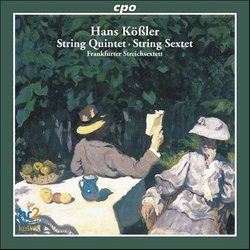| All Artists: Hans Koessler Title: Hans Kößler: String Quintet; String Sextet Members Wishing: 0 Total Copies: 0 Label: Cpo Records Original Release Date: 1/1/2007 Re-Release Date: 6/26/2007 Genre: Classical Styles: Chamber Music, Historical Periods, Classical (c.1770-1830) Number of Discs: 1 SwapaCD Credits: 1 UPC: 761203726929 |
Search - Hans Koessler :: Hans Kößler: String Quintet; String Sextet
 | Hans Koessler Hans Kößler: String Quintet; String Sextet Genre: Classical
|
Larger Image |
CD Details |
CD ReviewsRegeresque Music from Reger's Older Cousin J Scott Morrison | Middlebury VT, USA | 07/26/2007 (4 out of 5 stars) "Hans (von) Kössler (Koessler) (1853-1926) was a twenty-year-older cousin of Max Reger and his music sounds a good deal like Reger's although it does not appear to quite match Reger's expert contrapuntal workings. He spent most of his career as a teacher of composition, although he resigned his last post when he was in the fifties and from then on wandered the countryside -- he was a lifelong bachelor -- almost as did the minstrels of old. While professor at the Budapest Music Academy he counted among his students such luminaries as Béla Bartók, Zoltán Kodály, Ernö von Dohnányi and Emmerich Kálmán, which may account for the Brahmsian sound of each of those composer's early works. Kössler's own work indeed sounds like clotted Brahms, with dense textures, inverted chords in the bass and frequent use of off-kilter manipulations of basic meter. Unfortunately, for all its expert craft, the music is lacking much in the way of distinguished themes or melodies. Indeed, in this respect it most resembles the works of his better-known cousin.
We are, nonetheless, indebted to cpo for bringing out recordings of late Romantic works by lesser known composers. They are in the process of fleshing out our knowledge of the music of the late 1800s and early 1900s. The two works presented here represent a sampling of Kössler's small oeuvre of chamber works; he also wrote two string quartets and a piano quintet. The Sextet was written in 1902 and is in the usual four movements. It begins with portentous unison pronouncements for all six instruments of an upward tending theme that provides the primary material for the first movement. The theme is progressively truncated in the ensuing statement and development which lends a tension to its working out. The Scherzo, placed second, has an almost Mahleresque opening theme that has, like some of Mahler's (but also Brahms's) themes, a Hungarian cast. It tries to be jolly but there is a heaviness, a sense of underlying dread. The Adagio, for me the high point of the work, is a hymn of contemplation. The Finale is the most adventurous harmonically and features some almost Straussian chromatic side-slipping. Again, it purports to be high-spirited but there is also a minatory feeling almost as if to predict the fin de siècle malaise that culminated in the First World War, a dance in the dying of the light. The Quintet in D Minor was written ten years later, ca. 1912, but Kössler's style has not budged from that of the sextet. The texture, though missing the sextet's extra cello, remains rather congested. Although entirely serious in intent, the Quintet has its sarcastic folksy moments, reminiscent of similar moments in Mahler's symphonies. The first movement has a terse recapitulation that rather unbalances the movement's structure. The Adagio begins pianissimo, almost as if coming from a great distance, and employs simple five-part chorale harmonies. This is an entirely lovely movement, sounding at times like a slightly updated Bruckner. The Scherzo is episodic. Kössler uses unusually explicit markings such as 'reluctantly crude', 'quick-tempered', and 'quietly and resignedly.' This movement is perhaps the most skillfully written of all sections of these two works. It is almost Beethovenian or, better, Schumannesque in its quicksilver changes of mood. The Finale, marked Allegretto con moto, is high-spirited but occasionally interrupted by ominous rumblings which eventually, however, are banished. The Quintet ends triumphantly. The Frankfurter Streichsextett are, one gathers, an occasional group made up of members of the Frankfurt Radio Symphony Orchestra. Their playing is adequate but not transcendent. Perhaps I would have been more impressed with the pieces recorded here if their playing had been more persuasive. They are given only moderately good recorded sound. I cannot recommend this recording to the general music lover, but I suspect lovers of late romantic chamber music emanating from the ambit of such composers as Brahms and Reger might be interested to hear it. Scott Morrison" |

 Track Listings (8) - Disc #1
Track Listings (8) - Disc #1